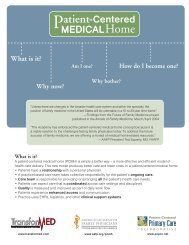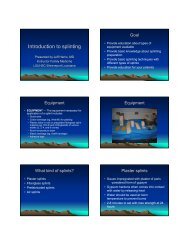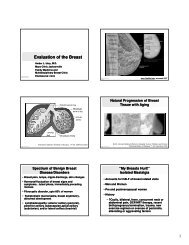New Drug Update 2009-2010 - LAFP
New Drug Update 2009-2010 - LAFP
New Drug Update 2009-2010 - LAFP
Create successful ePaper yourself
Turn your PDF publications into a flip-book with our unique Google optimized e-Paper software.
Fatigue 15%<br />
Abdominal pain (upper) 11%<br />
Hypotension / Decreased Blood<br />
10%<br />
Pressure<br />
Vomiting 9%<br />
Dizziness 7%<br />
Nausea 7%<br />
Weight increased 7%<br />
Irritability 6%<br />
Adverse Reactions Leading to Discontinuation - Eighteen percent (18%) of patients receiving INTUNIV<br />
discontinued from long-term studies due to adverse events. The most frequent adverse reactions leading<br />
to discontinuation (≥ 2%) were somnolence (3%), syncopal events (2%), increased weight (2%),<br />
depression (2%), and fatigue (2%). Other adverse reactions leading to discontinuation in the long-term<br />
studies (occurring in approximately 1% of patients) included: hypotension/decreased blood pressure,<br />
sedation, headache, and lethargy.<br />
Serious Adverse Reactions – In long-term open label studies, serious adverse reactions occurring in<br />
more than one patient were syncope (2%) and convulsion (0.4%).<br />
Effects on Height, Weight, and Body Mass Index (BMI) Patients taking INTUNIV demonstrated similar<br />
growth compared to normative data. Patients taking INTUNIV had a mean increase in weight of 1 kg (2<br />
lbs) compared to those receiving placebo over a comparative treatment period. Patients receiving<br />
INTUNIV for at least 12 months in open-label studies gained an average of 8 kg (17 lbs) in weight and 8<br />
cm (3 in) in height. The height, weight, and BMI percentile remained stable in patients at 12 months in the<br />
long-term studies compared to when they began receiving INTUNIV.<br />
DRUG INTERACTIONS: Guanfacine is a substrate of CYP3A4/5 and exposure is affected by CYP3A4/5<br />
inducers/inhibitors.<br />
CYP3A4/5 Inhibitors: Use caution when INTUNIV is administered to patients taking ketoconazole and<br />
other strong CYP3A4/5 inhibitors, since elevation of plasma guanfacine concentration increases the risk<br />
of adverse events such as hypotension, bradycardia, and sedation. There was a substantial increase in<br />
the rate and extent of guanfacine exposure when administered with ketoconazole; the guanfacine<br />
exposure increased 3-fold (AUC).<br />
CYP3A4 Inducers: When patients are taking INTUNIV concomitantly with a CYP3A4 inducer, an increase<br />
in the dose of INTUNIV within the recommended dose range may be considered. There was a significant<br />
decrease in the rate and extent of guanfacine exposure when co-administered with rifampin, a CYP3A4<br />
inducer. The exposure to guanfacine decreased by 70% (AUC).<br />
Valproic Acid: Co-administration of guanfacine and valproic acid can result in increased concentrations of<br />
valproic acid. The mechanism of this interaction is unknown, although both guanfacine (via a Phase I<br />
metabolite, 3-hydroxy guanfacine) and valproic acid are metabolized by glucuronidation, possibly<br />
resulting in competitive inhibition. When INTUNIV is coadministered with valproic acid, monitor patients<br />
for potential additive CNS effects, and consider monitoring serum valproic acid concentrations.<br />
Adjustments in the dose of valproic acid may be indicated when co-administered with INTUNIV.<br />
Antihypertensive <strong>Drug</strong>s: Use caution when INTUNIV is administered concomitantly with antihypertensive<br />
drugs, due to the potential for additive pharmacodynamic effects (e.g., hypotension, syncope)<br />
CNS Depressant <strong>Drug</strong>s: Caution should be exercised when INTUNIV is administered concomitantly with<br />
CNS depressant drugs (e.g. alcohol, sedative/hypnotics, benzodiazepines, barbiturates, and<br />
antipsychotics) due to the potential for additive pharmacodynamic effects (e.g., sedation, somnolence).<br />
118

















